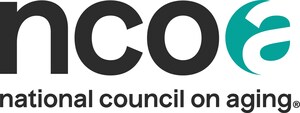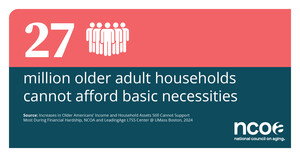WASHINGTON, Dec. 2, 2010 /PRNewswire-USNewswire/ -- The National Council on Aging (NCOA) is urging Congress to extend the Qualified Individual (QI) Medicare Savings Program, which is set to expire on Dec. 31, 2010.
(Logo: http://photos.prnewswire.com/prnh/20100615/NCOALOGO)
The QI program is critical to many seniors and younger adults with Medicare whose incomes are between 120 and 135 percent of the federal poverty level (only about $13,000 to $14,600 annually for 2010). The program pays for Medicare Part B premiums that cover physician and other outpatient services. Without QI assistance, these Medicare beneficiaries would be forced to spend about 10 percent of their limited incomes each year just on Part B premiums ($115.50 per month in 2011).
According to NCOA's CEO James Firman: "Failure by Congress to extend the QI program before the new year would be a devastating blow to low-income older Americans. It is imperative that action be taken during the lame duck session."
Receipt of the QI benefit also automatically entitles individuals to the full Medicare Part D prescription drug low-income subsidy (LIS or Extra Help), which has an average value of about $3,900 in 2010. In total, the QI benefit represents an average savings of $5,200 per year for these low-income beneficiaries, who can ill-afford the rising costs of medical and drug expenses and need to use the money for other basic needs, such as housing and food. The savings are significantly more for those with high prescription drug use.
If Congress fails to extend the QI assistance, hundreds of thousands of low-income beneficiaries who are already struggling under the economic downturn might have no choice but to drop their Part B coverage, leaving them with significant out-of-pocket costs every time they need to see a doctor or do without needed food, shelter, or medicine. If they later decide to re-enroll, they would face the full premium plus a harsh add-on penalty.
The extension of the QI program will help ensure that low-income older adults have access to the services necessary to improve their lives. It is imperative that QI be extended until Congress can stabilize this program by making it permanent.
About NCOA
The National Council on Aging is a nonprofit service and advocacy organization headquartered in Washington, DC. NCOA is a national voice for older Americans—especially those who are vulnerable and disadvantaged—and the community organizations that serve them. It brings together nonprofit organizations, businesses, and government to develop creative solutions that improve the lives of all older adults. NCOA works with thousands of organizations across the country to help seniors find jobs and benefits, improve their health, live independently, and remain active in their communities. For more information, please visit www.NCOA.org.
SOURCE National Council on Aging
WANT YOUR COMPANY'S NEWS FEATURED ON PRNEWSWIRE.COM?
Newsrooms &
Influencers
Digital Media
Outlets
Journalists
Opted In






Share this article